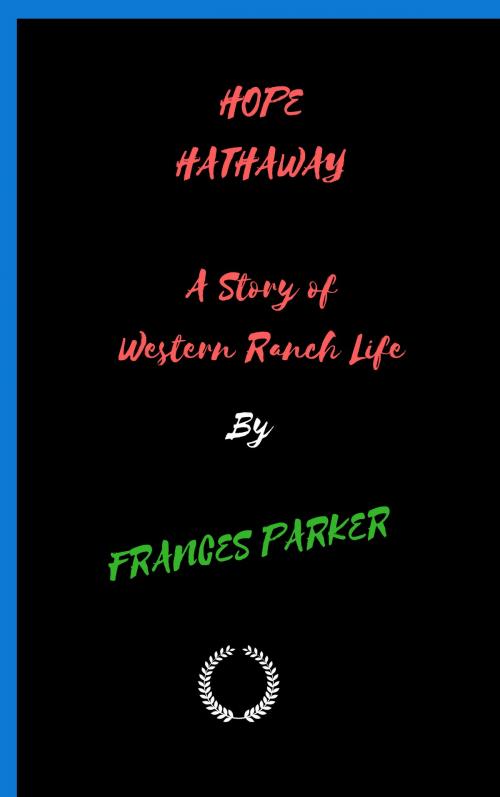HOPE HATHAWAY A Story of Western Ranch Life
Fiction & Literature, Action Suspense, Classics, Historical| Author: | FRANCES PARKER | ISBN: | 1230002424309 |
| Publisher: | Jwarlal | Publication: | July 12, 2018 |
| Imprint: | Language: | English |
| Author: | FRANCES PARKER |
| ISBN: | 1230002424309 |
| Publisher: | Jwarlal |
| Publication: | July 12, 2018 |
| Imprint: | |
| Language: | English |
Hathaway's home-ranch spread itself miles over an open valley on the upper Missouri. As far as the eye reached not a fence could be seen, yet four barbed-wires, stretched upon good cotton-wood posts, separated the ranch from the open country about.
Jim Hathaway was an old-time cattle-man. He still continued each summer to turn out upon the range great droves of Texas steers driven north by his cowboys, though at this time it was more profitable to ship in Western grown stock. He must have known that this was so, for every year his profits became less, yet it was the nature of the man to keep in the old ruts, to cling to old habits.
The old-time cowboy was fast disappearing, customs of the once wild West were giving way before an advancing civilization. He had seen its slow, steady approach year after year, dreading—abhorring it. Civilization was coming surely. What though his lands extended beyond his good eyesight, were not these interlopers squatting on every mile of creek in the surrounding country? The open range would some time be a thing of the past. That green ridge of mountains to the west,—his mountains, his and the Indians, where he had enjoyed unmolested reign for many years,—were they not filling them as bees fill a hive, so filling them with their offensive bands of sheep and small cow-ranches that his cattle had all they could do to obtain a footing?
On one of his daily rides he had come home tired and out of humor. The discovery of a new fence near his boundary line had opened up an unpleasant train of thought, and not even the whisky, placed beside him by a placid-faced Chinese servant, could bring him into his usual jovial spirits. After glancing through a week-old newspaper and finding in it no solace for his ugly mood, he threw himself down upon his office lounge, spreading the paper carefully over him. The Chinaman, by rare intuition, divined his state of mind and stole cautiously into the room to remove the empty glasses, at the same time keeping his eyes fixed upon the large man under the newspaper.
Hathaway generally took a nap in the forenoon after returning from his ride, for he was an early riser, and late hours at night made this habit imperative. This day his mood brought him into a condition where he felt no desire to sleep, so he concluded, but he must have fallen into a doze, for the sharp tones of a girl's voice directly outside his window brought him to his feet with a start.
"If that's what you're driving at you may as well roll up your bedding and move on!" It was spoken vehemently, with all the distinctness of a clear-toned voice. A man replied, but in more guarded tone, so that Hathaway went to the window to catch his words.
"You don't know what you're talking about," he was saying. "This is my home as well as yours, and I'd have small chance to carry out my word if I went away, so I intend to stay right here. Do you know, Hope, when you get mad like that you're so devilish pretty that I almost hate you! Look at those eyes! You'd kill me if you could, wouldn't you? But you'll love me yet, and marry me, too, don't forget that!"
Hathaway's home-ranch spread itself miles over an open valley on the upper Missouri. As far as the eye reached not a fence could be seen, yet four barbed-wires, stretched upon good cotton-wood posts, separated the ranch from the open country about.
Jim Hathaway was an old-time cattle-man. He still continued each summer to turn out upon the range great droves of Texas steers driven north by his cowboys, though at this time it was more profitable to ship in Western grown stock. He must have known that this was so, for every year his profits became less, yet it was the nature of the man to keep in the old ruts, to cling to old habits.
The old-time cowboy was fast disappearing, customs of the once wild West were giving way before an advancing civilization. He had seen its slow, steady approach year after year, dreading—abhorring it. Civilization was coming surely. What though his lands extended beyond his good eyesight, were not these interlopers squatting on every mile of creek in the surrounding country? The open range would some time be a thing of the past. That green ridge of mountains to the west,—his mountains, his and the Indians, where he had enjoyed unmolested reign for many years,—were they not filling them as bees fill a hive, so filling them with their offensive bands of sheep and small cow-ranches that his cattle had all they could do to obtain a footing?
On one of his daily rides he had come home tired and out of humor. The discovery of a new fence near his boundary line had opened up an unpleasant train of thought, and not even the whisky, placed beside him by a placid-faced Chinese servant, could bring him into his usual jovial spirits. After glancing through a week-old newspaper and finding in it no solace for his ugly mood, he threw himself down upon his office lounge, spreading the paper carefully over him. The Chinaman, by rare intuition, divined his state of mind and stole cautiously into the room to remove the empty glasses, at the same time keeping his eyes fixed upon the large man under the newspaper.
Hathaway generally took a nap in the forenoon after returning from his ride, for he was an early riser, and late hours at night made this habit imperative. This day his mood brought him into a condition where he felt no desire to sleep, so he concluded, but he must have fallen into a doze, for the sharp tones of a girl's voice directly outside his window brought him to his feet with a start.
"If that's what you're driving at you may as well roll up your bedding and move on!" It was spoken vehemently, with all the distinctness of a clear-toned voice. A man replied, but in more guarded tone, so that Hathaway went to the window to catch his words.
"You don't know what you're talking about," he was saying. "This is my home as well as yours, and I'd have small chance to carry out my word if I went away, so I intend to stay right here. Do you know, Hope, when you get mad like that you're so devilish pretty that I almost hate you! Look at those eyes! You'd kill me if you could, wouldn't you? But you'll love me yet, and marry me, too, don't forget that!"















